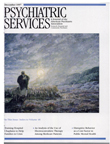Web Sites Worth Watching
Psychiatric Services offers a monthly listing of mental-health-related Web sites and other sites of interest. The list will change monthly as new sites are identified, existing sites add new features, and different categories of sites are included. We'd like maintaining the list to be an interactive process, so tell us about your favorite sites or what you'd like to be able to find on the Web. You can reach us by e-mail at [email protected].
Associations
Academy of Organizational and Occupational Psychiatry—www.aoop.org Sections include a members' bulletin board, the academy's mission statement, occupational research, full text of the OOP Bulletin, information on membership, an officers' directory, and information on the academy's collaboration with the Society for Human Resource Management.
American Association of Homes and Services for the Aging—www.aahsa.org Features range from tips for consumers on choosing facilities and services to educational and career opportunities for geriatrics professionals.
National Association of Psychiatric Health Systems—www.naphs.org Presents a statement of guiding principles on restraint and seclusion for behavioral health services and key findings and full text of the 1999 Hay Group study reporting data on the erosion of benefits for behavioral health care.
Journals
Journal of Telemedicine and Telecare —www.qub.ac.uk/telemed/jtt/ This international peer-reviewed academic journal is published quarterly by the Royal Society of Medicine. Available without charge on line are the tables of contents of every issue, information for contributors, and a list of editorial board members.
Government
National Institute on Early Childhood Development and Education—www.ed.gov/offices/oeri/eci/index.html This section of the Office of Educational Research and Improvement of the U.S. Department of Education sponsors research to enhance the quality of life of children and their families. The site's sections include research and development, frequently asked questions, funding opportunities, and hot research topics.
Medical
AIDS Research Information Center—www.critpath.org/aric Owned by ARIC, a private medical information service, the site primarily houses the AIDS Medical Information Service, through which professionals answer specific treatment questions from people who have HIV/AIDS and their caregivers and service providers.
Health News
Health Answers—healthanswers.com Healthway Online, Inc., operates this site, which features news from Reuters, articles from Physicians' Weekly, a drug database, and a list of resources on dozens of topics, from alternative medicine to weight control.
Other Useful Resources
The Survivors' Foundation—www.survivors-foundation.org/ This nonprofit organization provides referrals and grants for treatment to survivors of child abuse. Its Web site provides general information such as help in identifying symptoms and obtaining treatment, as well as an on-line support newsgroup for survivors of abuse.
Featured Site
American Association of Suicidology—www.suicidology.org
The American Association of Suicidology offers its Web site as a resource for anyone concerned about suicide, including researchers, therapists, survivors of suicide, and people who are in crisis. Visitors to the site who are in crisis are directed to a list of steps for receiving help. Visitors concerned about a suicidal person can read guidelines about what to say to the person and whom to contact for help.
The site provides a list of crisis centers and crisis hotlines in the U.S. and Canada, a national directory of support groups for survivors of suicide, and links to other sites of interest. Books on suicide prevention recommended by the association's publications committee are listed. Excerpts from Surviving Suicide, a quarterly newsletter written for and by survivors of suicide attempts, are featured.
The site also offers suggestions to clinicians for talking with media representatives reporting on a suicide.



